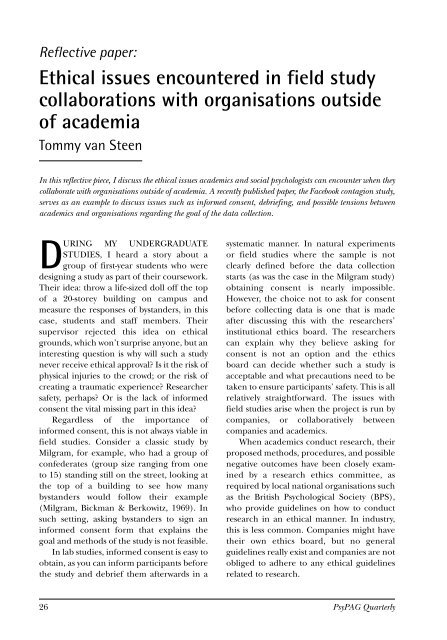Social Psychology Special Issue
PsyPAG-Quarterly-Issue-973
PsyPAG-Quarterly-Issue-973
Create successful ePaper yourself
Turn your PDF publications into a flip-book with our unique Google optimized e-Paper software.
Reflective paper:<br />
Ethical issues encountered in field study<br />
collaborations with organisations outside<br />
of academia<br />
Tommy van Steen<br />
In this reflective piece, I discuss the ethical issues academics and social psychologists can encounter when they<br />
collaborate with organisations outside of academia. A recently published paper, the Facebook contagion study,<br />
serves as an example to discuss issues such as informed consent, debriefing, and possible tensions between<br />
academics and organisations regarding the goal of the data collection.<br />
DURING MY UNDERGRADUATE<br />
STUDIES, I heard a story about a<br />
group of first-year students who were<br />
designing a study as part of their coursework.<br />
Their idea: throw a life-sized doll off the top<br />
of a 20-storey building on campus and<br />
measure the responses of bystanders, in this<br />
case, students and staff members. Their<br />
supervisor rejected this idea on ethical<br />
grounds, which won’t surprise anyone, but an<br />
interesting question is why will such a study<br />
never receive ethical approval? Is it the risk of<br />
physical injuries to the crowd; or the risk of<br />
creating a traumatic experience? Researcher<br />
safety, perhaps? Or is the lack of informed<br />
consent the vital missing part in this idea?<br />
Regardless of the importance of<br />
informed consent, this is not always viable in<br />
field studies. Consider a classic study by<br />
Milgram, for example, who had a group of<br />
confederates (group size ranging from one<br />
to 15) standing still on the street, looking at<br />
the top of a building to see how many<br />
bystanders would follow their example<br />
(Milgram, Bickman & Berkowitz, 1969). In<br />
such setting, asking bystanders to sign an<br />
informed consent form that explains the<br />
goal and methods of the study is not feasible.<br />
In lab studies, informed consent is easy to<br />
obtain, as you can inform participants before<br />
the study and debrief them afterwards in a<br />
systematic manner. In natural experiments<br />
or field studies where the sample is not<br />
clearly defined before the data collection<br />
starts (as was the case in the Milgram study)<br />
obtaining consent is nearly impossible.<br />
However, the choice not to ask for consent<br />
before collecting data is one that is made<br />
after discussing this with the researchers’<br />
institutional ethics board. The researchers<br />
can explain why they believe asking for<br />
consent is not an option and the ethics<br />
board can decide whether such a study is<br />
acceptable and what precautions need to be<br />
taken to ensure participants’ safety. This is all<br />
relatively straightforward. The issues with<br />
field studies arise when the project is run by<br />
companies, or collaboratively between<br />
companies and academics.<br />
When academics conduct research, their<br />
proposed methods, procedures, and possible<br />
negative outcomes have been closely examined<br />
by a research ethics committee, as<br />
required by local national organisations such<br />
as the British Psychological Society (BPS),<br />
who provide guidelines on how to conduct<br />
research in an ethical manner. In industry,<br />
this is less common. Companies might have<br />
their own ethics board, but no general<br />
guidelines really exist and companies are not<br />
obliged to adhere to any ethical guidelines<br />
related to research.<br />
26 PsyPAG Quarterly


